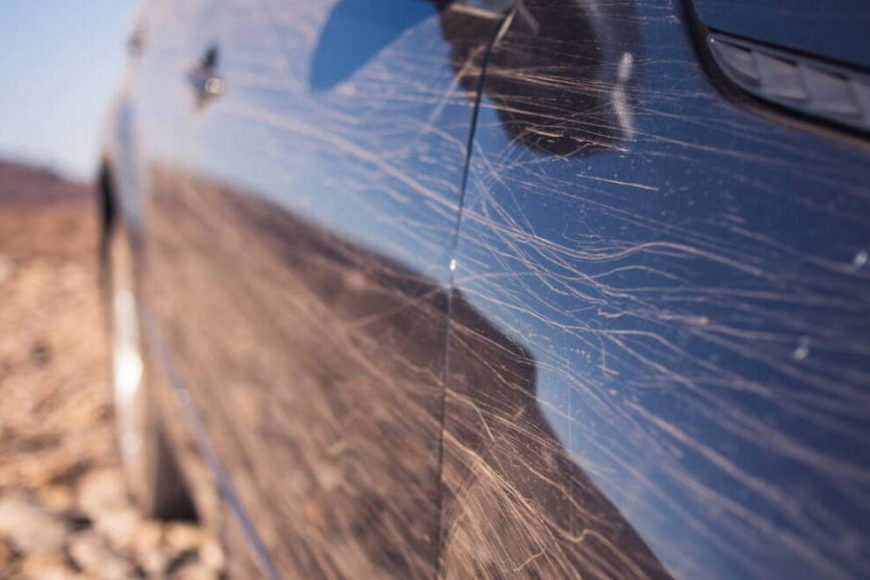- February 20, 2023
- By Nataly Hincapie
- In Auto Repair
- 3180
- 0

As car owners, it’s inevitable that our vehicles will accumulate scratches over time. Scratches can detract from the appearance of our cars and even reduce their resale value. However, not all scratches are created equal, and understanding the different types of car scratches can help you determine the best course of action to address them. In this article, we will explore the most common types of car scratches and provide recommendations for how to address them.
Before we dive into the different types of car scratches, it’s important to understand the anatomy of a car’s paint. A car’s paint job consists of three layers: the primer, the base coat, and the clear coat. The primer layer provides a smooth surface for the base coat to adhere to, while the base coat provides color and texture. The clear coat is the outermost layer that protects the base coat from damage and gives the car its shine.
Clear coat scratches are the most common type of car scratches. They occur when the clear coat is damaged but the base coat remains intact. These scratches are typically shallow and can often be removed with polishing or buffing. However, if the scratch is deep enough to expose the base coat, it will require more extensive repair.
Base coat scratches occur when the colored layer of paint is damaged but the clear coat remains intact. These scratches are typically more difficult to repair than clear coat scratches because they require color-matching. Depending on the severity of the scratch, the repair may require touch-up paint or repainting the entire panel.
Deep scratches occur when both the clear coat and base coat layers are damaged. These scratches are the most challenging to repair and often require professional assistance. In some cases, the affected panel may need to be completely replaced.
Rust scratches occur when a scratch in the paint allows moisture to reach the metal beneath the paint, leading to rust. Rust scratches can be particularly damaging because they can spread and corrode the metal of the car. It’s essential to address rust scratches as soon as possible to prevent further damage.
Also Read: Choosing the right tire for your car
Clear coat scratches can often be removed with polishing or buffing. Begin by washing the affected area with soap and water, then dry it thoroughly. Next, apply a polishing compound to a microfiber cloth and rub it into the scratch in a circular motion. Be sure to work the polishing compound into the scratch for several minutes, adding more compound as necessary. Finally, wipe away the excess compound with a clean microfiber cloth.
Base coat scratches require color-matching to achieve a seamless repair. Begin by washing the affected area with soap and water, then dry it thoroughly. Next, apply touch-up paint to the scratch with a small brush, being careful not to apply too much paint. Allow the paint to dry completely before applying a clear coat to protect the repair.
Deep scratches are more challenging to repair and often require professional assistance. If you are confident in your abilities, you can attempt to repair a deep scratch at home by first washing and drying the affected area. Next, apply touch-up paint to the scratch and allow it to dry completely. Then, use a clear coat to protect the repair.
Rust scratches require immediate attention to prevent further damage. Begin by washing the affected area with soap and water, then dry it thoroughly. Next, use sandpaper to remove any rust that has formed on the metal beneath the paint. Then, apply touch-up paint to the scratch and allow it to dry completely once the paint is dry, apply a clear coat to protect the repair. If the rust has spread extensively, it’s best to seek professional assistance to prevent further damage to the car.
While it’s impossible to prevent all scratches to your car, there are steps you can take to minimize their occurrence. First and foremost, avoid parking your car in areas with heavy foot traffic or near areas where people may brush against it, such as shopping carts or bicycles. Additionally, consider investing in a high-quality car cover to protect your car from environmental factors such as rain, snow, and wind-blown debris.
When washing your car, use a soft microfiber towel or a lamb’s wool mitt to minimize the risk of scratches from harsher materials. Finally, avoid washing your car in direct sunlight, as this can cause soap and water to dry too quickly and leave streaks on the paint.
In conclusion, understanding the different types of car scratches and their causes is essential to properly address them. While clear coat scratches can often be addressed with simple DIY methods, deeper scratches and rust scratches may require professional assistance. Taking preventative measures, such as parking in safe locations and using gentle washing techniques, can help minimize the risk of future scratches. By staying vigilant and addressing scratches as soon as they occur, you can help keep your car looking its best for years to come.































